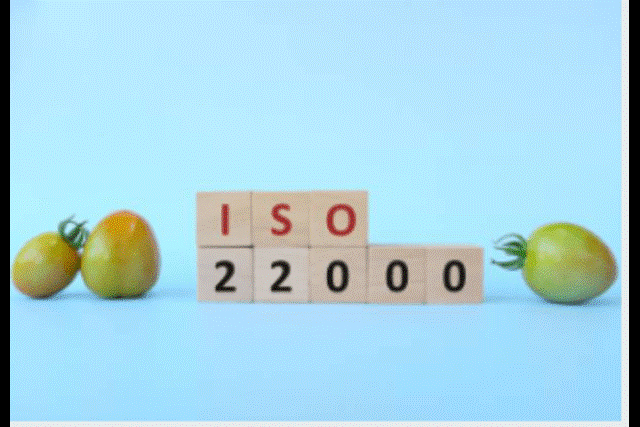ISO 22000: Nourishing Food Safety from Farm to Fork
ISO 22000 is a comprehensive food safety management system that encompasses the entire food supply chain, ensuring that food is safe at every stage, from production to consumption. This standard provides a systematic approach to identify, prevent, and eliminate food safety hazards, safeguarding the health of consumers.
At its core, ISO 22000 focuses on hazard analysis and critical control points (HACCP), a preventive approach that identifies potential hazards and implements measures to control them. From the initial stages of food production on farms to transportation, processing, and distribution, ISO 22000 sets a consistent and reliable framework to ensure food safety at every step.
By implementing ISO 22000, organizations in the food industry can demonstrate their commitment to quality and safety. Compliance with the standard provides a competitive edge, as consumers increasingly prioritize food safety when making purchasing decisions.
ISO 22000 also fosters trust among stakeholders, including consumers, suppliers, and regulatory authorities. Through regular audits and reviews, organizations can maintain and continuously improve their food safety management systems, giving stakeholders confidence in the reliability of the products they produce and distribute.
The Key Principles of ISO 22000: Ensuring Safe Food Production
ISO 22000 is built on a set of core principles that form the foundation of a robust food safety management system. These principles include communication, system management, prerequisite programs (PRPs), hazard analysis, and critical control points (HACCP).
Effective communication is a fundamental aspect of ISO 22000, ensuring that all relevant stakeholders are informed about food safety policies, procedures, and responsibilities. This includes internal communication within the organization and external communication with suppliers, customers, and regulatory authorities.
System management involves the establishment and maintenance of an effective food safety management system. Organizations must define objectives, conduct risk assessments, and allocate resources to ensure that the system operates smoothly and achieves its intended outcomes.
Prerequisite programs (PRPs) are the basic conditions and activities necessary to maintain a hygienic environment throughout the food supply chain. These include personal hygiene practices, sanitation, cleaning procedures, pest control, and maintenance of equipment and facilities.
Hazard analysis and critical control points (HACCP) form the core of ISO 22000’s preventive approach to food safety. Organizations must identify potential hazards in their food production processes and establish critical control points to monitor and control these hazards. This proactive approach helps prevent food safety issues before they occur.
By adhering to these key principles, organizations can create a food safety management system that prioritizes consumer well-being, meets regulatory requirements, and protects the reputation and success of the food industry.
ISO 22000 Internal Auditor Training: Enhancing Food Safety Compliance
ISO 22000 Internal Auditor Training is a specialized program designed to equip individuals within an organization with the skills and knowledge needed to conduct effective internal audits of their food safety management system.
Internal auditors play a vital role in maintaining the integrity and compliance of the ISO 22000 system. Through their objective assessments, they evaluate the effectiveness of the organization’s food safety processes, identify areas for improvement, and ensure that the system operates in line with ISO 22000 requirements.
During ISO 22000 Internal Auditor Training, participants learn the principles and techniques of auditing, including planning and conducting audits, gathering objective evidence, and reporting audit findings. They gain a deep understanding of ISO 22000 requirements, enabling them to assess the organization’s compliance accurately.
Internal auditors act as quality assurance advocates within the organization, working to identify and address potential non-conformities proactively. Their expertise in conducting thorough and objective audits helps the organization continuously improve its food safety management system.
Furthermore, ISO 22000 Internal Auditor Training prepares individuals to assist in external assessments, such as certification audits. Their contributions to maintaining compliance with ISO 22000 requirements increase the organization’s chances of achieving and retaining ISO 22000 certification.
By enhancing food safety compliance through internal audits, organizations can ensure that their food safety management system remains effective and reliable. The role of internal auditors is crucial in instilling confidence in consumers, stakeholders, and regulatory authorities that the organization is committed to delivering safe and high-quality food products.
Building a Robust Food Safety Management System with ISO 22000
Building a robust food safety management system is essential for organizations in the food industry to ensure the safety and quality of their products. ISO 22000 provides a structured framework to establish and maintain an effective food safety management system, addressing potential hazards and mitigating risks throughout the entire food supply chain.
The first step in building a food safety management system is to conduct a thorough hazard analysis. Organizations must identify potential biological, chemical, and physical hazards that could occur at any stage of food production and distribution. Hazard analysis lays the foundation for implementing preventive measures to control these hazards effectively.
Once hazards are identified, critical control points (CCPs) are established to monitor and control the identified hazards. These iso 22000 internal auditor course online are the points in the food production process where interventions can be applied to prevent, reduce, or eliminate hazards. Each CCP is equipped with specific monitoring and verification procedures to ensure the effectiveness of control measures.
The food safety management system also incorporates prerequisite programs (PRPs), which are the essential operational and hygienic conditions necessary to maintain a safe food production environment. PRPs cover a wide range of practices, including personnel hygiene, facility maintenance, sanitation, and pest control.
Clear communication and documentation are integral to the food safety management system. Organizations must maintain records of their food safety procedures, hazard analysis, control measures, and monitoring activities. These records provide evidence of compliance and support traceability in case of any food safety incidents.
By building a robust food safety management system in accordance with ISO 22000, organizations can demonstrate their commitment to providing safe and reliable food products to consumers. A comprehensive food safety management system not only safeguards consumer health but also protects the organization’s reputation and viability in the competitive food industry.
ISO 22000 Certification: Gaining Consumer Trust and Market Advantage
ISO 22000 certification is a prestigious achievement that demonstrates an organization’s commitment to food safety and quality. Certified organizations undergo rigorous assessments by accredited certification bodies to verify their compliance with ISO 22000 requirements.
For consumers, ISO 22000 certification serves as a powerful reassurance of product safety. It signifies that the certified organization has implemented robust food safety management systems and continuously strives to meet the highest international standards. Consumers are more likely to trust and choose products from ISO 22000 certified organizations, enhancing the certified organization’s market advantage.
ISO 22000 certification also opens doors to new business opportunities. In an increasingly competitive market, certification sets a certified organization apart from its non-certified competitors. Many retailers, suppliers, and business partners require ISO 22000 certification as a condition for collaboration, making certification a valuable asset for expanding business networks.
Certification also fosters internal benefits within the organization. The pursuit of ISO 22000 certification encourages a culture of continuous improvement, where employees are actively engaged in ensuring food safety throughout the organization. This commitment to quality can lead to increased efficiency, reduced risks, and improved overall performance.
Moreover, ISO 22000 certification enhances the reputation and credibility of the certified organization. It demonstrates to stakeholders, including regulatory authorities and industry peers, that the organization prioritizes food safety and consistently meets internationally recognized standards. A positive reputation for food safety can significantly impact consumer loyalty and brand reputation.
In conclusion
ISO 22000 certification is a valuable recognition that goes beyond mere compliance. It provides a competitive edge, increased consumer trust, and a strong market advantage. Organizations that achieve ISO 22000 certification showcase their dedication to delivering safe and high-quality food products, which resonates with health-conscious consumers.


